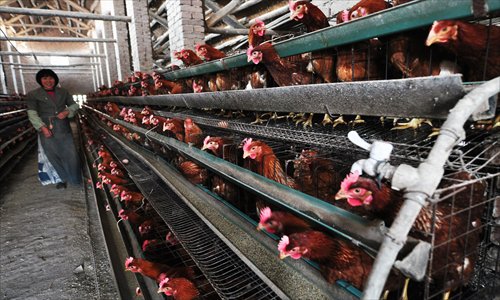Monitoring stepped up following bird flu infections

Health authorities in Shanghai and Anhui Province, where three cases of people being infected by a new type of bird flu were detected, have increased monitoring over influenza and unexplained pneumonia cases as the Chinese Center for Disease Control and Prevention (China CDC) assured the public that the risks of infection from the disease are "relatively low."
"Currently, some regions have detected a limited number of cases and no secondary cases have arisen among those close to the patients. Judging from the limited evidence, the risk of public infection from the virus is relatively low," the China CDC said in a post on its website.
Xu Jianguo, director of the Institute of Infectious Disease Prevention and Control with the China CDC, told the Global Times Monday that at this point, great attention should be paid to this new virus but there is no need to panic.
The new strain of bird flu, known as H7N9, resulted in two deaths in Shanghai and a victim in Chuzhou, Anhui, is now still in critical condition.
It was the first case of people being infected by this strain of the virus.
According to the National Health and Family Planning Commission, 88 people who had close contact with the three patients tested negative to the virus.
Leng Guangming, an official with the Shanghai Municipal Center for Disease Control and Prevention, said Monday that given only three cases have been confirmed, there is limited research material to investigate the disease, and experts are researching the virulence of H7N9 and the possibility of human-to-human transmission.
WHO Representative in China Michael O'Leary Monday told a media briefing that his office received notification from China of the human infection on Sunday, two days after the virus was confirmed in the laboratory, adding that there is no "transparency issue" in the disclosure and China reported the situation "in a timely manner."
"Going forward, the main thing is greatly increased surveillance both clinically and [at] laboratory, particularly in those areas, but also across China. Medical workers are now very alert to the possibility of this new virus when they have severe cases of pneumonia, and report quickly and investigate quickly," he noted.
O'Leary said at this point, there is no evidence for human-to-human transmission, even though concerns have been raised after two sons of an 87-year-old H7N9 victim in Shanghai were diagnosed with serious pneumonia and one of them died.
He noted that prime question remains whether the cases of the three people in the family were caused by the same virus, and even if they contracted the same virus the same source of infection is certainly possible if there was a quite infectious source that they were all in contact with.
According to Hong Kong-based Phoenix TV, a 27-year-old victim in Shanghai was reportedly a pork vendor, raising suspicion that the new virus was related to the thousands of dead pigs recently found floating in the Huangpu River which runs across the city.
Though influenza viruses do occur in pigs too, O'Leary noted there is now no evidence suggesting any relations between them and it seems to be "coincidental."
"In this case, the virus is closely related to avian viruses, so it makes us most suspicious that [poultry] is the source of infection," he said.
According to the WHO, the H7N9 virus has been recognized for years as existing in wild birds in certain locations, but not frequently. In Asia, it's only been identified in wild birds in Mongolia and South Korea, but never in China.
Liu Youning, a respiratory expert with the People's Liberation Army General Hospital, said that the public should stay away from feathers and excrement from sick poultry, and avoid slaughtering live chicken or duck.
The Life Times contributed to this story